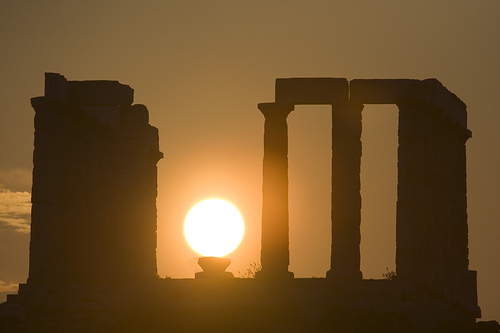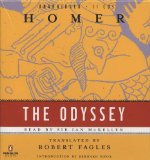
I have been taking an online course in Greek and Roman Mythology offered by Penn State through Coursera. I have just two weeks left, and most of my reading this summer has been for this course. I have fallen a bit behind in documenting my reading as well, which is something I hope to fix. I thought, however, that I would share the texts we have read, along with my brief reviews.
First, we read Fagles’ translation of [amazon_link id=”0140268863″ target=”_blank” ]The Odyssey[/amazon_link]. As I had so recently listened to Ian McKellen read Fagles’ translation, I opted not to re-read it, and I seemed to do just fine with the coursework.
The next text was Hesiod’s [amazon_link id=”019953831X” target=”_blank” ]Theogony[/amazon_link]. I had never read the Theogony before, and I admit I found parts of it quite interesting, at least in terms of origins for some of the popular myths with which I was familiar, including the displacement of Cronus by Zeus. This particular translation renders Uranus and Gaia as Heaven and Earth, respectively, and I admit because of unfamiliarity with the myths, I had to look that up. I think I would have liked it had their names not been translated. I found it interesting to learn, through the lectures, that the translation of “Chaos,” rendered in this translation “Chasm,” is not disorder so much as a void, which seems much more in line with the concept of the Big Bang and a move increasing toward entropy rather than away from it. In all, however, Theogony reads a little more like the “begats” in the Bible, and is not nearly as interesting as the other texts we read, though I can see why we read it.
Next we read two [amazon_link id=”0872207250″ target=”_blank” ]Homeric Hymns[/amazon_link]: the Hymn to Demeter and the Hymn to Apollo. The Hymn to Demeter recounts the story of Hades and Persephone, and the Hymn to Apollo recounts both Apollo’s birth and establishment of his Oracle at Delphi. For some reason, I didn’t get the requested translation, and I think the translations I used were a bit flowery and probably not as good. I don’t remember finding them to be all that gripping. To be honest, I can’t remember what I read much at all, which is probably not a good sign.
Afterward, we moved into Greek tragedy and read Aeschylus’s [amazon_link id=”0226307905″ target=”_blank” ]Agamemnon[/amazon_link] and [amazon_link id=”0226307913″ target=”_blank” ]Eumenides[/amazon_link]. When I was in high school, I got my hands on a list—I think I found it in a book—of texts all high school students should read in order to prepare for college. I knew my high school reading was sorely lacking, partly because I had moved so much that I went to three different high schools, and partly because we just didn’t read much. I read a lot of the books you probably remember reading in high school on my own. At any rate, Agamemnon was on that list, and I tried to read it back then and gave up. Reading it now, I think I can see why. For a play in which some interesting stuff happens, we sure don’t get to see any of it. It’s mostly some back-and-forth between Clytemnestra and the Chorus. I liked Eumenides better, mainly because it was an interesting look at jurisprudence, which was also how the course’s professor approached the play in his lectures. Talk about being damned if you do and damned if you don’t! Orestes must avenge his father’s murder, but in so doing, he must kill his mother, invoking the wrath of the Furies.
After this point in the course, I fell behind. I was supposed to read [amazon_link id=”0226307905″ target=”_blank” ]Oedipus Rex[/amazon_link] (which I have actually already read and taught before) and [amazon_link id=”0226307913″ target=”_blank” ]The Bacchae[/amazon_link], but I haven’t finished either one yet. Reviews to come once I do. I has been a long time since I read Oedipus Rex, but I am enjoying it great deal more than I liked either of the Aeschylus plays. However, I have had to put these readings aside in order to try, as much as possible, to catch up because this week, I was supposed to have read Books 1-5 of [amazon_link id=”0679729526″ target=”_blank” ]The Aeneid[/amazon_link] translated by Robert Fitzgerald, and I have to read Book 6 for next week as well as Books 3, 12, and 13 of Ovid’s [amazon_link id=”014044789X” target=”_blank” ]Metamorphoses[/amazon_link].
I think the texts were well chosen in terms of a good introduction to Greek and Roman myth, and I have to say I have learned a great deal from the lectures. I do happen to think that the pace of the course is too fast and the demands are too high for a Coursera course. I think a lot of people take Coursera courses to dip in a learn a little bit, and honestly, this one is as demanding as a normal college course in terms of time. However, it is a great course, and no one is twisting your arm making you take the quizzes or write the essays—you only do that if you want a certificate. But you know me. I have to be Hermione Granger about it. As a result, I don’t think I’ve had a chance to really savor what I’m learning. In fact, I can’t keep up.
Photo by uzi yachin 



